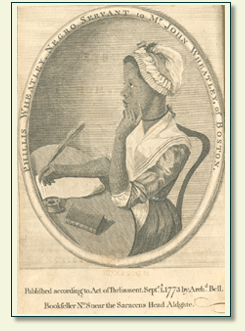|

Phillis Wheatley. Poems
on Various Subjects, Religious and Moral (1773), frontispiece.
|
PHILLIS
WHEATLEY (ca. 1753 – 1784)
Because she arrived in the American colonies as an African
slave, the year and location of Phillis Wheatley's birth remain unknown. She
received her name from the slave ship Phillis
in which she was transported and acquired the surname of her purchaser John
Wheatley, who intended her to be his wife's servant in their Boston home. Impressed by her intelligence
and manner, the Wheatleys raised Phillis more as a daughter than a slave,
allowing their oldest daughters to educate her and allotting her a bedroom
and a place at their dining table.
After learning to speak, read, and write English with
remarkable ease, Phillis Wheatley began to compose poetry, and the verse that
made her reputation was an elegy for George Whitefield, a Methodist minister
whom Phillis Wheatley had seen preach in Boston shortly before his death in 1770.
Her elegy, reprinted throughout the colonies and in London, earned her international fame. As a
female African American poet, she captured much attention, and her only
published volume, Poems on Various
Subjects, Religious and Moral, appeared in 1773 with a foreword
attesting to her talent signed by eighteen prominent Bostonian men and a
portrait of the author sitting at her writing table with a pen in hand.
After Mrs. Wheatley died in 1774, the family dispersed,
and Phillis Wheatley married free black John Peters and settled in Delaware. Later
abandoned by her husband, she worked in lodging houses until her health
deteriorated and she became totally impoverished. She died alone on the
outskirts of Boston
of complications resulting from the birth of her third child.
Phillis Wheatley was the first African American to publish
and the first American woman to try to support herself through her writing.
Regarding slavery, she wrote in a letter in 1774 that "in every human
breast, God has implanted a Principle, which we call Love of Freedom; it is
impatient of Oppression, and pants for Deliverance." She supported the
American Revolution and admired political figures such as George Washington,
with whom she corresponded.
Other portraits appear in:
Phillis Wheatley. Memoir
and Poems of Phillis Wheatley (1834), frontispiece; also 1838
edition.
Sarah J. Hale, ed. Woman’s
Record (1853), p. 552; also 1855 ed.
Evert A. and George L. Duyckinck, eds. Cyclopaedia of American Literature
(1855), vol. 2, p. 367.
Abner D. Jones. The American Portrait Gallery (New York, 1855), p. [403].
Abner D. Jones, ed. The Illustrated
American Biography, vol. 3 (1855), p. 147.
NEXT>
|


